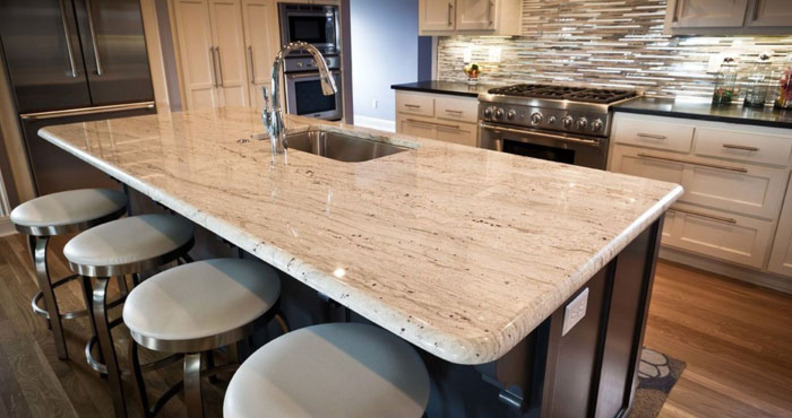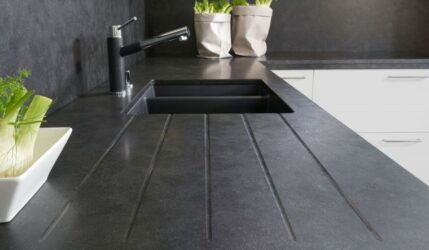7+ Pros & Cons of Granite Countertop Finishes
What is a granite countertop or worktop?
Granite is a mixed and granular igneous rock that is unlayered in structure. The natural composition of different natural mineral types determines the color and appearance of the worktop or countertop.
The appearance of the granite varies, depending on the region where the granite is mined. This makes it a characteristic and unique product.
Granite has a reasonably open structure. Therefore, pits can be visible when the light shines over the surface of the worktop or countertop. Also typical for this natural material is that there can be small superficial cracks and natural stains on the surface.
Is granite a natural stone?
Granite is a 100% natural product and therefore a natural stone.
Finishes granite countertop:
- A polished finish: the surface is smooth, shiny, and very easy to clean. Therefore, it is very maintenance-friendly.
- A honed finish: the surface is matte, with a lightly sanded appearance. This makes the surface slightly more stain-prone.
- A satinado finish: the surface is shiny and rough. This finish is stain-prone.
What are the advantages and disadvantages of a granite countertop?
| Granite Countertop Finishes | Pros | Cons |
|---|---|---|
| Polished | – High-gloss, mirror-like finish
– Highlights the color and character of the granite – Resists staining |
– Shows water spots and fingerprints
– May require regular resealing |
| Honed | – Matte, smooth surface
– Less likely to show scratches and etches |
– More vulnerable to staining
– May require more frequent sealing |
| Leathered | – Textured surface
– Hides fingerprints and water spots |
– Can be harder to clean due to texture
– May require more frequent sealing |
The advantages of a granite countertop:
- Granite is a 100% natural product and therefore unique.
- Granite is very durable due to its hardness and mass.
- Granite is easy to maintain.
- Granite can withstand heat very well.
- Granite is very impact and scratch-resistant.
The disadvantages of a granite countertop:
- Small superficial cracks can occur on the surface.
- Because granite is somewhat porous, staining can occur.
- The honed and satinado variants are more stain-prone than the polished granite worktops.
- The honed and satinado variants are more scratch-prone than the polished granite worktops.
- Because it is a natural product, there can be small color differences in it.
- Granite is a heavy material. This can be disadvantageous when installing in apartments and, for example, government buildings.
Can a granite countertop withstand heat?
Granite is very resistant to heat because it is made up of minerals, a hot baking dish or a hot pan can be placed directly on the granite top, although it is recommended to use a coaster to prevent scratching, it also insulates the heat.
Can a granite countertop crack?
(hair) – Cracking can occur due to the natural properties of the material. this is partly what gives the material its character. Granite can crack from pressure from above, for example when someone sits or stands on the worktop.
The risk of cracking is higher where a cutout has been made for a sink or hob.
Is a granite countertop vulnerable?
A granite worktop is very durable. It is also scratch and impact resistant. Therefore, it is not very vulnerable but, like any (stone) worktop, you have to be careful with bumping a pan on the edge.
What should I pay attention to when buying a granite worktop or granite countertop?
Keep in mind that the properties of the material match the lifestyle of the place where it is installed. Also consider the installation of the sink, do you want a flush mount or an undermount sink? Making cutouts in the factory in advance is easier and the risk of damage is therefore less.
Why should I impregnate a granite worktop or countertop?
The supplier may prescribe this in order to be able to claim the warranty of the respective granite worktop or countertop. In addition, an impregnating agent ensures that the granite work or countertop becomes moisture and dirt repellent. This prevents moisture and dirt from penetrating directly.
How often should I impregnate a granite worktop?
The interval of impregnation strongly depends on the degree of use. A minimum of 2 times per year is advised. If stains occur regularly, you can impregnate the surface more often.
Impregnation can also be part of the warranty conditions. This determines with which agent and which interval impregnation should be done. This depends on the supplier. Always ask for the (warranty) conditions and maintenance instructions when purchasing a granite work or countertop.
How do I clean a granite countertop or worktop?
- Clean daily with a damp microfiber cloth and household soap.
- Dry the surface afterwards with a dry microfiber cloth.




